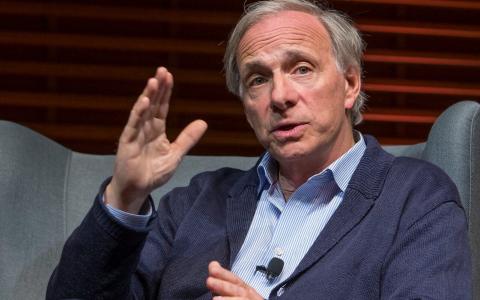
China’s growing global clout poses “enormous implications” for the entire world, according to billionaire investor Ray Dalio, who sees the United States hobbled by soaring debt, populism and a fractured political system.
The founder of the $138 billion Bridgewater Associates hedge fund, the world’s largest, believes that China’s rise is ushering in a changing world order with Beijing at its center. The backdrop bodes ill for the world’s largest economy, which is struggling to contain a relentless surge in COVID-19 infections, which is widening unsustainable economic imbalances.
According to Dalio, Sino-American relations are being defined by more than the ongoing bilateral trade dispute that has ricocheted across world markets for much of the Trump era. The dynamic is expected to continue, regardless of whether or not former Vice President Joe Biden wins the general election next week.
"It has a lot of implications — it's not just a trade war,” Dalio told Yahoo Finance in an interview at its All Markets Summit. China's rise as "a great power, challenging an existing great power, the United States," has "enormous implications,” the investor added.
“So the markets and everything were reverberating the trade war, the technology war, the geopolitical war in Taiwan, and the South China Seas. And then, also the capital war — we're seeing that emerge," he added.
History as a guide
In his upcoming book, "The Changing World Order," Dalio examines the interrelationships among three forces that drive cycles which include high levels of debt and low interest rates that limit the central bank's ability to stimulate the economy; growing wealth and political gaps; and the rise of one great power [China] challenging an existing great power [the US].
The 71-year-old investor analogizes the current period to the period immediately preceding World War II, but also draws other parallels from history. For the last two years, Dalio has studied the rise and fall of reserve currency empires dating back 500 years.
He's also looked at the rise and beginning of the decline of the United States' and its reserve currency, and China — and doesn’t like what he sees.
The status quo in 2020 “is really concerning," Dalio said. "And, when it's it's even more concerning when I went back to find the 500 years and the times that repeated over and over again."
Dalio found that there are big cycles at the start of a new world order characterized by prosperous periods where an empire is fundamentally strong, but sparks painful adjustment when taken to excess.
After World War II ended in 1945, a new world order began with creating a new global monetary system that established the U.S. as the dominant economic power and the world's reserve currency. The U.S. also become politically significant, serving as the home to the United Nations' headquarters in New York City and the International Monetary Fund and the World Bank in Washington, D.C.
However, the status and prosperity has come with a high price, with the U.S. now engaged in record deficit spending that many economists and investors warn is a time bomb.
Dalio told Yahoo Finance that the cycle is exacerbated by the dollar’s status as a global safe haven, “because the world wants to save in that reserve currency. And that gets the country deeper and deeper in debt.”
Combined with ultra-loose monetary policy, “you have those debt increases, and you have bubbles, but you have prosperity. And bubbles are really fun,” Dalio added. “They're really enjoyable, they're great. But then you get to the point that there is a limitation to that” — warning that the U.S. was reaching the end of its long-term debt cycle.
Meanwhile, monetary policy is worsening the gap between the wealthy and the poor, “because those who have financial assets do better than those who don't have financial assets, and you have a wider and wider wealth gap,” the investor said.
"And when you have that wider wealth gap, and then you have another downturn in an economy, that's a formula for a lot of conflict," he added.
Dalio’s belief is that monetary policy will eventually evolve to a level where "the free market will play a much less role at determining... capital market flows” — leading to more politicized decision making by officials and central bank.
The investor added that the government's increasing influence and direction of where that money goes will have a big impact on the economy and the markets. What's more, as the government plays a bigger role and more debt is monetized, that will have implications on the value of financial assets and currencies.
All of this also happens against a backdrop of China’s rise, and a more prominent role for its currency, the renminbi.
“It's got a long way to go before it's going to be a reserve currency, but I think that one of the important things to see is that you're going to see favorable capital flows for China," Dalio said.
The battle for IPOs
This year’s boom in initial public offerings has been characterized by a large share of new floatations being done in China’s markets rather than U.S. exchanges. More recently, at $34.5 billion, Ant Group, the world's biggest IPO, will list its shares in Shanghai and Hong Kong, eschewing the U.S. markets.
"New offerings, that'll drive capital. More and more, you're going to see the internationalization of the renminbi,” said Dalio, pointing out that nearly half of 2020’s IPOs have gone to Shanghai or Hong Kong.
“You're going to see capital flows moving those directions, and those kind of analogous movements have repeated through history," he said.
With geopolitics driving investment decisions, Dalio added that investors will want to diversify well across asset classes, countries, and currencies.
"If you diversify well, you lower your risk without lowering your expected returns, if you know how to do that well,” he told Yahoo Finance.
This article originally appeared on Yahoo! Finance.



